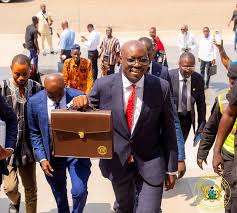The Ghanaian economy has recovered from its worst crisis in a generation and is now ready to enter into sustained growth, Finance Minister Cassiel Ato Forson declared late Thursday.
“The storm is past; the foundation is firm. Ghana’s economy is breathing again, stronger, steadier, and full of promise,” Forson said while presenting the 2026 Budget Statement in parliament.
He recalled that upon assumption of office in January, the country faced an economy in distress, weighed down by debt, weakened by mismanagement, and stripped of confidence.
In contrast, he said, the economy today is on the right footing, “not just a recovery; it is a reset. It is the story of a nation that refused to stay down. This revival is a rebirth from the ashes of a daunting inheritance, a heavy burden laid upon us by the previous administration.”
He listed a real gross domestic product, which expanded by 6.3 percent in the first half of 2025, up from 5.1 percent in the same period of 2024, driven by stronger agriculture and services, with an ever-lowering inflation and renewed business confidence as key evidence of economic recovery.
Forson cited the services sector as the heartbeat of the recovery, surging 8.8 percent, with agriculture growing at 8.8 percent.
Amid a surge in household consumption at 8.2 percent, the minister said government spending has slowed to 3.7 percent, in line with the government’s resolve to control public spending.
The lesson learned from the past mistakes, according to Forson, is the powerful truth that fiscal discipline is the backbone of national progress, and there is no shortcut to responsible economic management.
He observed that inflation has fallen faster than anyone imagined, from 23.8 percent in Dec. 2024 to 8.0 percent by October 2025, not by sheer luck, but due to disciplined fiscal policy, steady monetary management, stable exchange rates, and stronger domestic production.
“Mr. Speaker, confidence is returning. The Black Star (pseudonym for Ghana) is rising once more. Ghana is back, strong, stable, and full of hope,” the minister added.
According to him, the improved macroeconomic outlook has culminated in renewed investor confidence in the Ghanaian economy, as exports grew by 11.5 percent, led by gold, cocoa, and nontraditional exports. “This is growth that creates jobs, lifts incomes, and builds lasting stability.”

